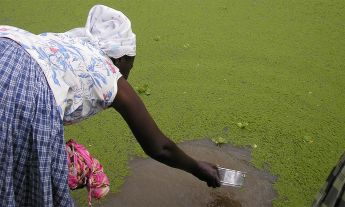A single gram of poop contains 50 diseases, one million bacteria, 1,000 parasites, 100 worm eggs and 10 million viruses, by journalist Rose George’s tally. For people who have flushing toilets, this is something that they rarely have to think about. But for the 2.5 billion people in the world who have no toilet at all, feces is to blame for a devastating toll of disease.
Consider some other numbers. 4000 children die every day from diarrhea, a common symptom from exposure to many of those fecal microbes. That’s more than die from HIV/AIDS, tuberculosis and measles combined. Each year, $260 billion is lost because of lack of sanitation. Despite this, just 10 to 25 percent of related budgets focus on sanitation, compared to 75 to 90 percent for clean water. Clean water is no help when it is continuously contaminated by poor sanitation.
In a talk given at TED2013, George describes how she “plunged into the world of sanitation, toilets, and poop,” an odoriferous adventure that she chronicled in her 2009 book The Big Necessity: The Unmentionable World of Human Waste and Why It Matters. We spoke with George about people’s reactions to her project, the wide-ranging impact of sanitation and the future of poop.
In your talk, you start off with a story about your own bathroom experience — the first time you thought, “Wait, where is this stuff going?” What happened after that? How does a reporter start researching poop?
Well, there’s a long story and a short story. I’ll give you the short one. The first thing I did when I decided that I was going to dive into the world of poop was look at who was doing stuff in that world. The first I came across was the World Toilet Organization. So one of the first things I did was to go to their annual show in Moscow. I ended up in a Russian winter near the Kremlin, and the WTO had its exhibit on one floor and, on the floor below, was a fur coat exhibition. There were more people in the fur coat exhibition.
It’s quite a select gathering of people. It’s certainly changed over the past six years, but at that point, it was really quite a small field. That’s where I started making my acquaintances and getting to know who was who and who was doing what. A few people I met in that couple of days ended up being written up in the book — like Joe Madiath in Orissa, and Jack Sim. This guy Scott Chapman, who I met in the café, looked really bored. We started having this conversation, and he said, “Why should I be interested in toilets?” I started telling him what I had learned by that point — that 2.6 billion people don’t have a toilet — and he looked really surprised. He became a really enormous toilet evangelist. So that was really quite fun to watch.
“The World Toilet Organization had its exhibit on one floor and, on the floor below, was a fur coat exhibition. There were more people in the fur coat exhibition.”
That is where I started, and then I went to a couple of other WTO events. I just ended up sort of wandering around the world with people who I found were doing interesting things.
What was it like pitching the topic of poop to editors and your agent? What was their reaction? Did they get it initially, or did they take some convincing?
I have two main publishers. My first was the British publisher Portobello. It was bit of a weird process because I went to them with another idea for a book, about Darfur. For various reasons nobody wanted it, and the publisher there, we were sitting in his little office and he said, “Rose, I don’t want that book but I do want you.” I can’t remember the exact list [I pitched him] but toilets was about number three. His face was not that impressed. And he said, “Um yeah, well, what do you mean?” So I started on my 2.6 billion, and Sulabh International, and untouchables in India who have to clean toilets with their bare hands in this day and age. And I do remember that he actually got up out of his chair with excitement, and from then on was fully behind it.
Then on the back of that book deal was a four-part series for Slate on the world of sewage. I went down to the sewers in London and looked at a campaigning group in London called RATS, Rowers Against Thames Sewage, and I went to Sewage School and hung out with kids learning to make sewage soup and how to clean sewage. And it was great — really good fun. Subsequently, I ended up getting a publishing contract with Metropolitan Books, and they were absolutely behind it from the beginning. There was never any question — which is weird. There is certainly a perception that Americans are more prudish about this kind of stuff, but that absolutely has not been the case. Americans have been much more enthusiastic about this book all the way through, and I’ve done far more American radio interviews, far more American publicity, and I still get emails from Americans and Canadians. So that’s been quite a revelation for me.
Why do you think this topic is so taboo in general? Obviously there are various reactions depending on where you are, but why in general do you think this is something we don’t talk about enough?
I actually don’t think it’s true that it is taboo — I just think there’s no avenue for discussion about it. It’s been my experience that people are very happy to talk about it. When I was doing the research, which was a two-year process, honestly only about two or three people changed the subject. And I was asked all the time what I was working on, and I’d always say “toilets” or “public health” or “sanitation.” Invariably, people would pause just to take that in. Then they would go, “Oh, well I’ve got a great toilet story!” The thing is, we do or think about this stuff every day. Every parent with a toddler has to think about it when they change a nappy or diaper. Everyone who has to find a decent toilet in a shopping mall has to think about it. Everybody has to think about it because they spend a lot of time in the toilet.
“The thing is, we do or think about this stuff every day. Every parent with a toddler has to think about it when they change a nappy or diaper. Everyone who has to find a decent toilet in a shopping mall has to think about it.”
I think there are two areas where poop still is taboo. I think it’s been taboo in advertising on TV. The toilet industry and the toilet paper industry have felt unable to be frank about their product, but I think that is changing quite a lot. In the last few years, there have been lots of plain-speaking toilet paper ads that I’ve seen in the US and in the UK as well. But the more important place where I do think it is very taboo still is in the corridors of power, and in the people who fund sanitation as a development issue. Certainly when I started, it was considered for some reason unspeakable. Politicians don’t think it is a vote-getter because they don’t hear people demanding toilets — whereas they do demand clean water. The other thing is that it sort of gets kicked around between various ministries. Because sanitation has so many effects across all aspects of development — it affects education, it affects health, it affects maternal mortality and infant mortality, it affects labor — it’s all these things, so it becomes a political football. Nobody has full responsibility. There’s no Minister of Sanitation. There doesn’t necessarily need to be one, but the responsibility for it in a political environment gets shared around and doesn’t really get the attention it deserves.
I think that’s changed now because sanitation has become a human right, so governments are going to be obliged to take it seriously. I think that’s a wonderful change. I think the taboo is breaking all over the place, so it is quite exciting.
You mentioned all the different areas that poop and sanitation affect. In your talk, you also mention education and economics. At what point in your research did you realize that your topic had such wide impact? Was it a gradual process, or was it something you had a hunch about early on?
It was definitely a learning process. I mean, everybody is an expert on poop, really, but I started out not knowing how to make the connection. Because none of it is rocket science. If you have a girl who doesn’t have a toilet at school, she is not going to want to go to school when she’s got her period. It’s pretty straightforward. But I just didn’t make the connection. Only along the way, it was talking to people like Joe Madiath or the Water Supply and Sanitation Collaborative Council, the UN advocacy agency that deals with sanitation — people who were in the field. The other thing was there wasn’t much connection between people working in sanitation. There’s all sorts of divisions in development — in water, and health, and education and sanitation — so you kind of have to learn from all sorts of people.
But the economics, that was specifically a guy called Guy Hutton who’s been really, really excellent at putting together the economic argument. And again it makes sense. If people can’t work, obviously there’s going to be an economic impact. But I would have never linked that to the toilet.
When you started your research, did you have a hunch that toilets would have such a serious impact on human health?
I had no idea that people — that children — were dying of diarrhea at the rate that they do. That was a real shock. In fact, I still find that shocking. It’s completely shameful because it is so preventable.
“Children are dying of diarrhea … I still find that shocking. It’s completely shameful because it is so preventable.”
Another thing I found really striking were the unexpected health aspects. For example, malnutrition: you can find children who are malnourished in a well-fed family. Relatively recently, people have figured out, it sometimes is because they have diarrhea. So no matter how many high-protein foods the child is given, it goes straight through them. There’s now been research that links sanitation to stunted growth. That’s pretty new to me. And vaccinations. When my book came out, someone wrote to me who is a vaccinator. And he wrote, “You know, people just don’t realize that sometimes because these kids are malnourished and because they have diarrhea, we have to give them six or ten times the amount of vaccine to take it in. People don’t know the connection.” They don’t link sanitation to all these things. I find that really fascinating.
On a lighter note, what was the silliest thing you learned about toilets or poop? Were there any crazy gold-plated toilets, or crazy advanced Japanese toilets?
Oh yeah. I used to work at Colors magazine as a writer and researcher, and someone had a bit of an obsession with toilets. We used to regularly feature the latest gold-plated toilet, usually from somewhere in Asia. And then there is of course a senator in South Korea who built a toilet-shaped museum, or a toilet-roll-shaped museum, I think. There’s all kinds of stuff. And I think it is important to have the funny humor stuff, because that is what disarms people and makes it easier to talk about.
People like Sulabh International, a fantastic Indian NGO that has built toilets all over India, they know that, so they set up the International Museum of Toilets, which is in a compound near the international airport in Delhi. And it’s great. It’s just one room, but it’s got replicas of toilets and it’s pretty humorous. They have a copy of a French commode in the shape of books.
Wacky is fine — I knew I had to have some humor in it. Sulabh really helped, and Japan helped as well. But I always was careful and determined not to write a book of toilet humor. Other people have done that, and that’s fine, but it is a serious subject. It was quite tricky doing that balancing act.
Are there any sanitation initiatives that you think are doing a particularly good job acknowledging this poop problem and trying to address it? I’m thinking in particular of the Gates Foundation’s Toilet Challenge.
Over the last two or three years it’s been really exciting because a lot has changed. I think the Gates Foundation should absolutely be applauded, because I think they’ve been really instrumental in that. As soon as Bill and Melinda Gates started talking about toilets — and they openly use the word “toilet” — that gave the subject huge legitimacy that it didn’t have before. I think that’s broken the ice for NGOs that were maybe a little shy about talking about toilets. They disguised it as water-related illnesses, or as “people need water.” And they do. But what’s the dirtiness in the water? It’s usually poop. I think that’s been an opening of the floodgates a little bit.
And there’s all sort of exciting stuff going on. Sanitation hackathons, people working on apps, Matt Damon doing his famous press conferences. All that is really, really great. And it’s new. It makes me hopeful actually that maybe something has changed.
Speaking of the Toilet Challenge, do you have a favorite amongst the winners?
No I don’t, actually, and I’m sort of careful not to. When people ask me, “What’s the best toilet? What’s the best solution?” I’ve always said the solution is flexibility. The solution is understanding that we need all sorts of solutions. So I think they’re all great. This is a bit of a cop-out, but my favorite is the actual job description that they put out, which is that it has to be low-cost and it has to be sustainable. To me, that is brilliant. I don’t mind beyond that. The more ideas, the better. It’s pretty obvious if you travel in the developing and the developed world, it’s not one-solution-fits-all. Some countries have more water than others — some can afford to use clean water to flush their poop away and some can’t.
“When people ask me, ‘What’s the best toilet?’ I’ve always said the solution is flexibility. The solution is understanding that we need all sorts of solutions.”
So I think the best thing that reinventing the toilet did is not provide actual innovations in toilets — which is true, it does need innovating — but make us examine the system itself, which has been unquestioned for so long and is high-energy and high-cost. Even in the US and the UK, our sewers are crumbling. It’s a pretty unsustainable system. I think that’s what they’ve done that is really valuable.
What do you find most hopeful about the future of poop?
That we’re talking about it. For heaven’s sake, I’ve just done a TED Talk on it. Six years ago, I never would have thought that was possible. I think things have changed so rapidly in the past few years, and I am really hopeful, actually, even though the statistics are still so woeful. Even though it’s the most off-track in the Millennium Development Goals, I think there is a legitimacy around it now. There are ads on American TV for, I can’t remember which toilet paper, but they were saying toilet paper doesn’t clean you — it’s like having a shower with a dry towel. And I think, “Oh, I said that!” But it’s great to see it on TV. I remember four or five years ago, Toto put an ad in Times Square showing bare bottoms, and they had to be taken down. So I really think there’s hope that this is going to be a more talkable subject. And maybe when people get an invitation from an NGO or a charity, maybe they’ll give money for a toilet and not just a clean water supply.
Brooke Borel is a regular contributor to TED.

















